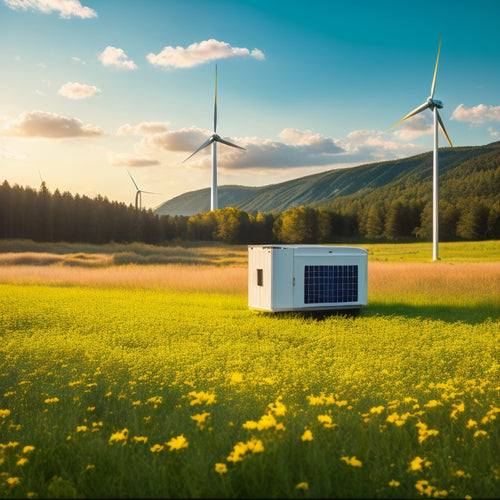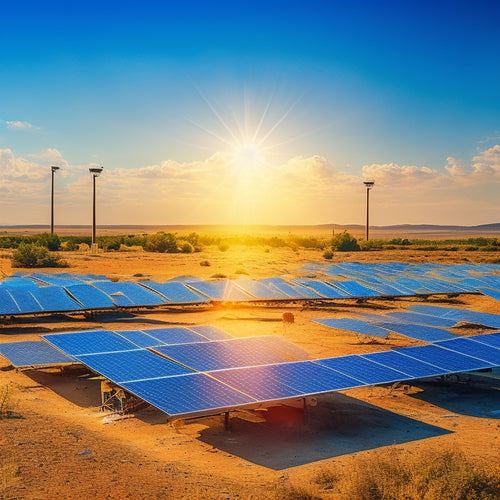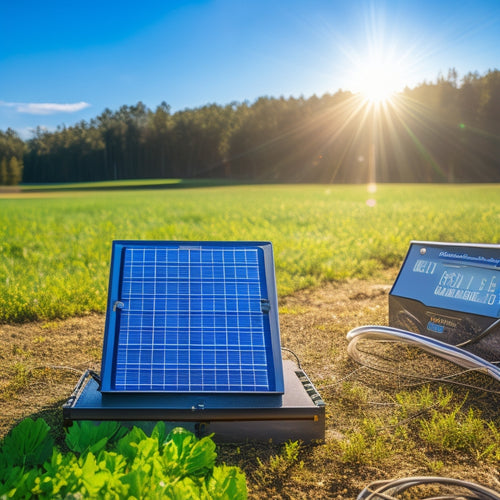
What to Know Before Installing Solar Power
Share
Before installing solar power, you'll want to assess your energy needs by reviewing past utility bills and conducting an energy audit to guarantee the system meets your demands. You'll also need to evaluate your roof's condition, considering its age, structural integrity, and potential shading or obstructions. Additionally, familiarize yourself with local building codes, choose the right solar panels based on efficiency and budget, and select a reputable installer. Don't forget to budget for the installation and consider financing options and tax incentives. By understanding these key factors, you'll be well-equipped to traverse the installation process and reap the benefits of solar power - and there's more to investigate to guarantee a successful change.
Overview
- Assess your energy needs by reviewing past utility bills and conducting an energy audit to ensure the solar power system meets your demands.
- Evaluate your roof's condition, including its age, history, and structural integrity, to ensure it can support the weight of solar panels.
- Consider local building codes, regulations, and permits required for solar power installation to avoid costly rework or system shutdown.
- Choose the right solar panels by balancing budget constraints with energy needs, and prioritizing durability, weather resistance, and efficiency.
- Research and select a reputable installer with proper certifications, credentials, and customer reviews to ensure a high-quality installation.
Assessing Your Energy Needs
When determining your energy needs, look to your past utility bills for clues about your energy consumption patterns. Analyze your usage to identify the total amount of energy you consume daily, monthly, and annually. This will help you determine the size of the solar panel system you'll need to meet your energy demands.
Consider your energy consumption habits, including the number of appliances and devices you use, their wattage, and the number of hours they're used daily. It's crucial to conduct an energy audit to guarantee the renewable energy system meets your energy needs.
Think about your future expansion plans, such as adding more family members or installing energy-intensive appliances. By understanding your energy needs, you can design a solar power system that provides the freedom to generate clean energy and reduces your reliance on the grid.
Evaluating Your Roof's Condition
You'll want to assess your roof's condition before installing solar panels, as its age, history, and structural integrity can impact the system's performance and longevity.
It's crucial to select high-efficiency solar panels with a minimum 25-year warranty to guarantee reliable energy production high-quality solar panels.
You should also consider shading and obstructions, such as skylights, vents, or nearby trees, that could reduce energy production.
Roof Age and History
Evaluating your roof's condition is an important step in the solar power installation process, as it directly impacts the performance and longevity of your solar panel system.
Your roof's age and history play a significant role in determining its suitability for solar panels. If your roof is old or has a history of repairs, it may not be stable enough to support the weight of solar panels.
Considerations such as grid connection and ideal site selection are vital in guaranteeing a stable supply of energy.
You should consider roof maintenance tips, such as inspecting your roof regularly for damaged or missing shingles, to confirm it's in good condition.
Additionally, you may want to investigate roof financing options to replace your roof before installing solar panels. A new roof will provide a solid foundation for your solar panel system, guaranteeing peak energy production and minimizing potential issues down the line.
Shading and Obstructions
Shading and obstructions can greatly impact the performance of your solar panel system.
You'll want to assess your roof's condition to identify any potential shading issues. Consider using a solar pathfinder tool to conduct a shading analysis, which will help you determine the amount of shade your roof receives throughout the day.
This analysis will highlight areas where trees, buildings, or other obstructions may be blocking sunlight. You may need to trim trees or adjust the panel installation to minimize shading.
Structural Integrity Check
Before installing solar panels, it's essential to assess your roof's structural integrity to guarantee it can support the added weight and withstand various environmental conditions.
You'll need to evaluate your roof's load bearing capacity, which is the maximum weight it can safely hold. This includes the weight of the solar panels, mounting hardware, and any potential snow or debris.
Additionally, consider your roof's wind resistance, as high winds can put additional stress on the structure. A thorough inspection can identify potential issues, such as damaged or rotten wood, loose or missing shingles, and inadequate roofing materials.
Understanding Local Building Codes
One essential aspect of solar power installation is compliance with local building codes. You'll need to verify your system meets the required standards for your area.
Research permitted designs, considering factors like roof size, material, and orientation. Familiarize yourself with inspection timelines, as they can impact your project's schedule and budget.
Be aware that codes vary by region, so it's vital to consult with local authorities to determine specific requirements. Failure to comply can result in costly rework, fines, or even system shutdown.
Choosing the Right Solar Panels
When selecting solar panels, you'll need to take into account several key factors.
First, you'll want to look at panel efficiency ratings, which can greatly impact the amount of electricity your system generates.
You'll also need to balance your budget with your energy needs, as budget-friendly options exist, but durability is often a vital aspect to prioritize.
Panel Efficiency Ratings
Since you're investing in solar power, you want to maximize your energy output, and that's where panel efficiency ratings come in.
These ratings measure how well a solar panel converts sunlight into electricity. Look for panels with high efficiency ratings, usually above 20%. This means they can generate more power per hour of sunlight.
When comparing solar panel technology, efficiency comparison is key. Higher-efficiency panels may cost more, but they'll provide more energy per unit area.
Consider the space you have available for installation and balance that with your energy needs. By choosing the right panels, you'll be generating clean energy and enjoying the freedom that comes with it.
Budget-Friendly Options Exist
Your roof is about to become a power plant, and the right solar panels can make all the difference. While high-efficiency panels may be out of your budget, don't worry - there are budget-friendly options that can still provide significant savings. Affordable financing options and tax incentives can help make solar power more accessible.
| Option | Description |
|---|---|
| Low-Cost Panels | Lower-efficiency panels at a lower cost, perfect for those on a tight budget. |
| Mid-Range Panels | Balance efficiency and cost, offering a sweet spot for most homeowners. |
| Premium Panels | High-efficiency panels with advanced technology, ideal for those seeking maximum energy output. |
Durability Matters Most
By the time you're ready to install solar panels, you've likely considered the financial benefits and budget-friendly options.
Now, it's essential to focus on durability. You want solar panels that can withstand harsh weather conditions and last for a long time. Look for panels with a proven track record of weather resistance and a long solar panel lifespan.
A durable solar panel system guarantees you maximize your energy output and savings. A longer lifespan also means you won't need to replace panels frequently, reducing waste and environmental impact.
When choosing the right solar panels, prioritize durability to guarantee a reliable and sustainable energy source for years to come.
Selecting a Reputable Installer
Reliability is key when it comes to your solar power system, and selecting a reputable installer is essential to ensuring a successful installation.
You'll want to research potential installers thoroughly, checking their credentials, such as certifications from organizations like the North American Board of Certified Energy Practitioners (NABCEP).
Also, read customer reviews from multiple sources, like Yelp, Google, and the Better Business Bureau, to get a sense of the installer's work quality, communication, and customer service.
Be wary of extremely low bids, as they may indicate a lack of experience or poor quality equipment.
Budgeting for Solar Installation
The cost of going solar can vary considerably, depending on the size of your system, local installation costs, and available incentives.
You'll need to evaluate these factors when budgeting for your solar installation. On average, the upfront cost of a solar panel system ranges from $15,000 to $30,000.
However, you can investigate financing options, such as loans or power purchase agreements, to reduce the initial outlay.
While the upfront cost may seem overwhelming, remember that solar power can provide long-term savings on your energy bills.
In fact, you can save up to $500 per year on your electricity costs.
With the right financing and a well-designed system, you can start generating clean energy and enjoying the financial benefits of solar power.
Frequently Asked Questions
Can I Install Solar Panels on a Rented Property?
You'll need your landlord's agreement to install solar panels on a rented property, but you can investigate installation options like lease-to-own or removable systems that won't damage the property, ensuring a smooth changeover when you move out.
Are Solar Panels Affected by Weather Conditions?
You're not alone in wondering if solar panels are weather wimps. Coincidentally, it's a common concern! Solar efficiency takes a hit from extreme weather conditions like heavy snow, hail, and intense heat, but modern panels are designed to withstand these weather impacts.
Can I Sell Excess Energy Back to the Grid?
You can sell excess energy back to the grid through net metering, earning energy credits that offset your utility bills; this symbiotic relationship allows you to utilize your freedom to generate clean energy and profit from it.
Do Solar Panels Require Regular Maintenance?
You'll need to clean your solar panels regularly to maximize energy output, typically every 6-12 months, depending on your location and climate, and perform routine maintenance checks to guarantee peak performance and extend their lifespan.
Are There Any Government Incentives for Solar Power?
You'll be pleased to know that you're eligible for federal tax credits, covering up to 26% of your solar panel system's cost, and potential state rebates, which can considerably slash your upfront investment in going solar.
Ready to Buy
As you stand on the cusp of utilizing the sun's energy, remember that knowledge is power. You've weighed your energy needs, scrutinized your roof, and maneuvered local codes. You've chosen the perfect panels and installer. Now, it's time to take the leap. The question is, are you ready to shine?
Related Posts
-

Sustainable and Eco-Friendly Generators for a Reduced Carbon Footprint
Sustainable and eco-friendly generators are perfect for cutting your carbon footprint and increasing energy efficienc...
-

What Happens Without a Charge Controller in Solar Panels
Without a charge controller in your solar panel system, you risk overheating batteries due to overcharging, which can...
-

Choosing the Right Solar Power Charge Controller
Choosing the right solar power charge controller is crucial for maximizing energy efficiency and extending battery li...


